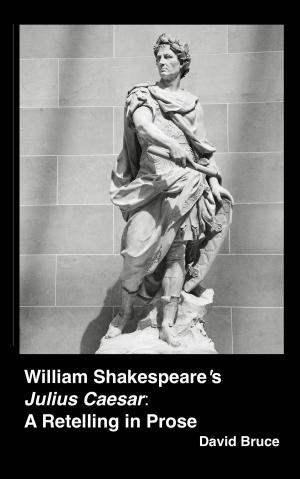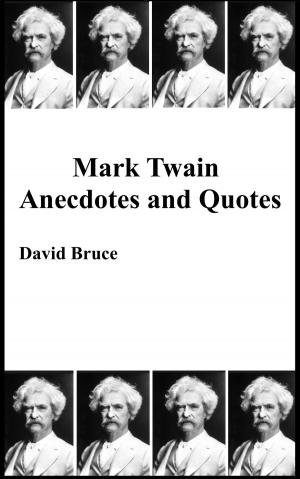From the Iliad to the Odyssey: A Retelling in Prose of Quintus of Smyrna’s Posthomerica
Fiction & Literature, Classics, Literary| Author: | David Bruce | ISBN: | 9781301034802 |
| Publisher: | David Bruce | Publication: | February 18, 2013 |
| Imprint: | Smashwords Edition | Language: | English |
| Author: | David Bruce |
| ISBN: | 9781301034802 |
| Publisher: | David Bruce |
| Publication: | February 18, 2013 |
| Imprint: | Smashwords Edition |
| Language: | English |
I would like to see my retellings of classic literature used in schools, so I give permission to the country of Finland (and all other countries) to buy one copy of this eBook and give copies to all students forever. I also give permission to the state of Texas (and all other states) to buy one copy of this eBook and give copies to all students forever. I also give permission to all teachers to buy one copy of this eBook and give copies to all students forever.
Teachers need not actually teach my retellings. Teachers are welcome to give students copies of my eBook as background material. For example, if they are teaching Homer’s “Iliad” and “Odyssey,” teachers are welcome to give students copies of my “Virgil’s ‘Aeneid’: A Retelling in Prose” and tell students, “Here’s another ancient epic you may want to read in your spare time.”
Homer created the epic poems the Iliad and the Odyssey. The Iliad tells only a small part of the story of the Trojan War. For example, the Iliad does not tell the story of the Trojan Horse although Homer knew about the Trojan Horse and assumed that his audience knew its story. Other, shorter epic poems that made up the Epic Cycle told the rest of the story of the Trojan War.
The Iliad and the Odyssey show many signs of oral composition; they were written down perhaps in the eighth century B.C.E. The Iliad and the Odyssey have survived to the present time, but the other epic poems of the Epic Cycle have been lost since ancient times. Quintus of Smyrna, writing perhaps in the third century C.E., wrote an epic poem that retold the tales recounted in the lost epic poems of the Epic Cycle. He told the story of the Trojan War from the burial of Hector until the Greeks set sail for home after the fall of Troy. In other words, he told the story of the Trojan War from the end of the Iliad to when Odysseus sets sail for home in the Odyssey after Troy has fallen. Homer is an epic poet of genius; Quintus of Smyrna is not. Quintus of Smyrna, however, did a service to Humankind by retelling the stories of the other epic poems of the Epic Cycle and telling us some of the most important stories, such as those about the deaths of Achilles and of Paris and the fall of Troy, that Homer did not tell us. Unfortunately, he chose not to tell the story of the theft of the Palladium from Troy by Odysseus and Diomedes; he merely mentions that story.
In this retelling, as in all my retellings, I have tried to make the work of literature accessible to modern readers who may lack the knowledge about mythology, religion, and history that the literary work’s contemporary audience had.
I would like to see my retellings of classic literature used in schools, so I give permission to the country of Finland (and all other countries) to buy one copy of this eBook and give copies to all students forever. I also give permission to the state of Texas (and all other states) to buy one copy of this eBook and give copies to all students forever. I also give permission to all teachers to buy one copy of this eBook and give copies to all students forever.
Teachers need not actually teach my retellings. Teachers are welcome to give students copies of my eBook as background material. For example, if they are teaching Homer’s “Iliad” and “Odyssey,” teachers are welcome to give students copies of my “Virgil’s ‘Aeneid’: A Retelling in Prose” and tell students, “Here’s another ancient epic you may want to read in your spare time.”
Homer created the epic poems the Iliad and the Odyssey. The Iliad tells only a small part of the story of the Trojan War. For example, the Iliad does not tell the story of the Trojan Horse although Homer knew about the Trojan Horse and assumed that his audience knew its story. Other, shorter epic poems that made up the Epic Cycle told the rest of the story of the Trojan War.
The Iliad and the Odyssey show many signs of oral composition; they were written down perhaps in the eighth century B.C.E. The Iliad and the Odyssey have survived to the present time, but the other epic poems of the Epic Cycle have been lost since ancient times. Quintus of Smyrna, writing perhaps in the third century C.E., wrote an epic poem that retold the tales recounted in the lost epic poems of the Epic Cycle. He told the story of the Trojan War from the burial of Hector until the Greeks set sail for home after the fall of Troy. In other words, he told the story of the Trojan War from the end of the Iliad to when Odysseus sets sail for home in the Odyssey after Troy has fallen. Homer is an epic poet of genius; Quintus of Smyrna is not. Quintus of Smyrna, however, did a service to Humankind by retelling the stories of the other epic poems of the Epic Cycle and telling us some of the most important stories, such as those about the deaths of Achilles and of Paris and the fall of Troy, that Homer did not tell us. Unfortunately, he chose not to tell the story of the theft of the Palladium from Troy by Odysseus and Diomedes; he merely mentions that story.
In this retelling, as in all my retellings, I have tried to make the work of literature accessible to modern readers who may lack the knowledge about mythology, religion, and history that the literary work’s contemporary audience had.















